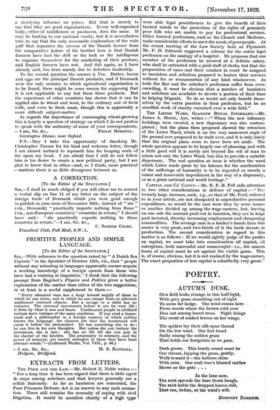EXTRACTS PROM LETTERS.
THE Poon Als-D THE LAW.—Mr. Robert E. Noble writes :— " For a long time it has been argued that there is little esprit de .cops among solicitors and that lawyers generally are a selfish fraternity. As far as barristers are concerned, the Poor Prisoners Defence Act is an answer to ..any such accusa- tion. There still remains the necessity of coping with civil litigation. It would be manifest charity of :a high type were able legal practitioners to give the benefit of their trained minds to the protection of the rights of genuinely poor folk who are unable to pay for professional services. Other learned professions,,such as the Church and Medicine, make considerable efforts to meet the needs a poor people. At the recent meeting of the Law Society held at Plymouth Mr. P. H. Edwards suggested a scheme for the entire legal profession on the analogy of a hospital. He proposes that one member of the profession be secured at a' definite salary, who shall be entrusted with a paid staff of clerks, but that the preparation of cases and their conduct in court be assigned to barristers and solicitors prepared to bestow their services without fee or remuneration of any kind whatsoever. As both the Bar and the solicitor's profession suffer from over- crowding, it must be obvious that a number of barristers and solicitors are available to devote a portion of their time to helping litigants. To do so would not only benefit them- selves by the extra practice in their profession, but be an unselfish work of charity exercised over a wide field."
THE LLSTER WARD, GLASGOW ,ROYAL INFIRMARY..—MT.
James A. 'Morris, Ayr, writes :—" When the new infirmary buildings were erected, a new dispensary was also contem- plated; but -the plans then proposed showed the retention of the Lister Ward, which is on the very narrowest angle of 'the ground now proposed to be built over, and it is only lately that the original plans seem to have been set aside. The whole question appears to be largely one of planning, and with a little good will it is surely not beyond the wit of man to retain not only the Lister Ward, but also to provide a suitable dispensary. The real question at issue is whether the ward which Lister made great by his labours for the amelioration of the sufferings of humanity is to be regarded as merely a minor and removable impediment in the way of a dispensary, or as a great national and world heritage."
CAPITAL AND CA' CANNY.—Mr. E. F. B. _Fell calls attention to two other considerations in defence of capital :—" Ex- tremely large incomes, such, e.g., as that of Mr. Ford,,referred to in your article, are not dissipated in unproductive personal expenditure, as would be the case were they by some means or another divided up among the wage-earners, but, leaving on one side the amount paid out in taxation, they are in large part invested, thereby increasing employment and cheapening commodities. The average sum in a banker's hands from this source is very great, and two-thirds of it the bank invests in production. The second consideration in regard to this matter is as, follows : If .we would rightly judge of the profits on capital, we must take into consideration an capital, all enterprises, both successful and unsuccessful—i.e., the unseen losses of capital must be set against the visible gains. This is, of course, obvious, but it is not realized by the wage-earner. The exact proportion of lost capital is admittedly very great."


























































 Previous page
Previous page